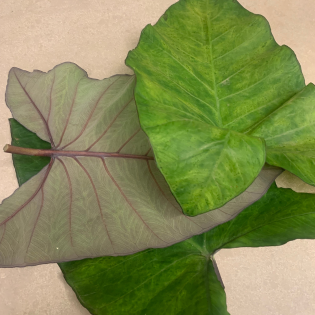COLOCASIA LEAVES

Colocasia leaves, or taro leaves, are large heart-shaped leaves from the colocasia esculenta plant, commonly called taro or arbi. These leaves are integral to many cuisines worldwide, particularly in tropical and subtropical regions. Colocasia leaves have a distinct flavour and are rich in essential nutrients. They are a good source of dietary fibre, vitamins A and C, and minerals such as calcium and iron. These leaves should not be had raw.
Nutritional content of Colocasia Leaves (100g) -
- Calories -42 Kcal
- Carbohydrates -6.7 g
- Fibre - 3.7 g
- Protein - 4.98 g
- Fats - 0.74 g
Boosts up your immune system -
- Consuming a cup of leaves provides a significant amount of your daily requirement of vitamin C. By incorporating a few taro leaves into your daily diet, you can effectively enhance your immune system and promote overall well-being, shielding your body from various diseases and health concerns.
Helps in weight loss -
- Taro leaves offer a remarkable advantage as they are low in fat and rich in protein. It makes them an excellent choice for individuals aiming to reduce body fat and promote muscle development. By incorporating taro leaves into your diet, you can enjoy their favourable nutrient profile, aiding you in achieving your fitness goals and promoting a leaner physique
Improves skin health-
- Taro leaves contain an amino acid (i.e., a protein building block) called threonine. Threonine is critical for producing elastin and collagen, which are two of the key components of normal skin. Adequate quantities of these substances can prevent your skin from developing wrinkles. Consider adding taro leaves to your meals to achieve healthy, glowing, and younger-looking skin.
Keeps heart health in check-
- general, a diet high in nutrient-dense fruits and vegetables has been associated with improved heart health again and again. Taro leaves fall into a vegetable category called dark leafy greens, which also includes vegetables like spinach, kale, and Swiss chard. They also provide a good source of dietary nitrates which help to promote healthy blood pressure.
Lowers Blood Pressure-
- Taro leaves can lower high blood pressure or hypertension due to the presence of saponins, tannins, carbohydrate and flavonoids. High blood pressure can lead to stroke, damaging the brain’s blood vessels and blocking blood flow to the brain. It also causes ischemic heart disease. So, eating taro leaves will benefit your heart as well.
- Therefore, including taro leaves as part of an overall nutritious diet may help promote heart health. Taro leaves are low in calories, high in fiber, and high in micronutrients. This contributes to several potential health benefits, such as promoting a healthy body weight, boosting heart health, and preventing disease.


